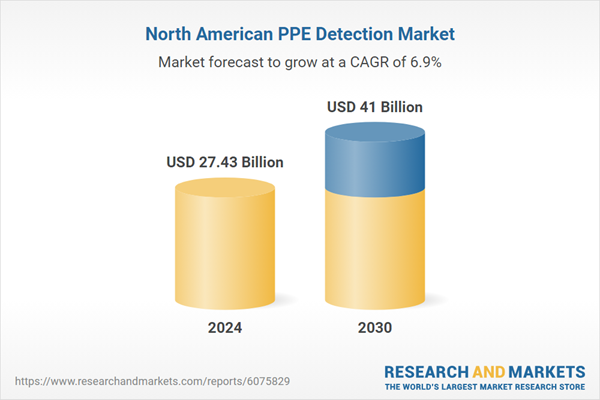Speak directly to the analyst to clarify any post sales queries you may have.
10% Free customizationThis report comes with 10% free customization, enabling you to add data that meets your specific business needs.
Modern PPE detection systems, featuring wearable sensors, automated monitoring tools, and real-time alert mechanisms, help identify non-compliance instantly, enhancing safety and minimizing accident risks. The integration of digital technologies such as IoT, AI, and machine learning has made these systems more reliable, scalable, and cost-effective. As businesses look to improve their safety management practices, the adoption of smart PPE detection solutions is gaining momentum. The continued investment in safety infrastructure and the expansion of industry-wide digitalization are expected to support sustained market growth in the coming years.
Key Market Drivers
Stringent Workplace Safety Regulations and Standards
One of the primary drivers of the North America PPE Detection Market is the increasing enforcement of stringent safety standards by regulatory bodies such as OSHA. These regulations mandate the use of proper personal protective equipment across a range of industries, compelling businesses to implement systems that ensure and document compliance.PPE detection solutions enable real-time monitoring, providing automated alerts and data logging that help companies avoid violations, reduce accident risks, and streamline compliance during audits. In 2024 alone, OSHA issued over 40,000 citations related to PPE violations, underlining the growing importance of proactive compliance measures. Businesses are therefore adopting detection technologies as a safeguard against operational and reputational risks, driving demand across the region.
Key Market Challenges
High Implementation and Maintenance Costs
The adoption of advanced PPE detection systems comes with significant financial barriers, particularly for small and mid-sized businesses. The cost of acquiring and installing hardware components like cameras, sensors, and wearable devices, along with software platforms for real-time monitoring and data analytics, can be substantial.In addition, these systems require regular maintenance, calibration, and updates to ensure operational accuracy and system integrity. As technological advancements continue, keeping systems up to date can introduce further cost burdens. Scaling these solutions across multiple sites also increases complexity and expense, making affordability a key concern that could slow broader adoption and market penetration.
Key Market Trends
Increased Adoption of Artificial Intelligence and Machine Learning
The growing integration of AI and machine learning technologies is transforming the PPE detection market. AI-powered systems are capable of analyzing visual data and sensor inputs to detect compliance in real-time, reducing the need for manual monitoring and minimizing response times in case of non-compliance.Machine learning enhances detection accuracy over time by learning from operational patterns and anomalies. These capabilities make the systems more reliable and scalable, especially for high-risk industries that prioritize safety and precision. As AI and ML technologies continue to evolve, businesses are increasingly relying on them to enhance safety infrastructure, reduce human error, and improve overall compliance management. This trend is expected to remain central to market innovation in the years ahead.
Key Market Players
- Honeywell International Inc.
- Zebra Technologies Corporation
- 3M Company
- Siemens AG
- Apple Inc.
- Garmin Ltd.
- Cognex Corporation
- Ecolab Inc.
Report Scope:
In this report, the North America PPE Detection Market has been segmented into the following categories, in addition to the industry trends which have also been detailed below:North America PPE Detection Market, By Product Type:
- Real-Time Monitoring Systems
- Contact Tracing Solutions
- Fall Detection Devices
- Wearable Health Sensors
- Other
North America PPE Detection Market, By End User:
- Healthcare Facilities
- Construction Sites
- Manufacturing Industries
- Transportation & Logistics
- Other
North America PPE Detection Market, By Connectivity:
- Bluetooth
- Wi-Fi
- NFC
- Cellular
- Other
North America PPE Detection Market, By Device Type:
- Wearables
- Fixed Sensors
- Mobile Devices
- Embedded Systems
- Other
North America PPE Detection Market, By Country:
- United States
- Canada
- Mexico
Competitive Landscape
Company Profiles: Detailed analysis of the major companies present in the North America PPE Detection Market.Available Customizations:
With the given market data, the publisher offers customizations according to a company's specific needs. The following customization options are available for the report.Company Information
- Detailed analysis and profiling of additional market players (up to five).
This product will be delivered within 1-3 business days.
Table of Contents
Companies Mentioned
- Honeywell International Inc.
- Zebra Technologies Corporation
- 3M Company
- Siemens AG
- Apple Inc.
- Garmin Ltd.
- Cognex Corporation
- Ecolab Inc.
Table Information
| Report Attribute | Details |
|---|---|
| No. of Pages | 120 |
| Published | April 2025 |
| Forecast Period | 2024 - 2030 |
| Estimated Market Value ( USD | $ 27.43 Billion |
| Forecasted Market Value ( USD | $ 41 Billion |
| Compound Annual Growth Rate | 6.9% |
| Regions Covered | North America |
| No. of Companies Mentioned | 8 |









